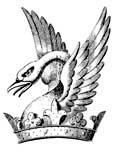
The Second Last Word
LOOKING BEYOND WORLDLY THINGS
Catherine Mary Drexel was born in Pennsylvania in 1858, the second daughter of Catholic parents Hannah Langstroth and Francis Anthony Drexel, the latter a banker and philanthropist whose brother, Anthony Joseph, would found Drexel University in 1891. Catherine enjoyed a childhood of comfort and ease on a 90-acre estate in northeast Philadelphia, though her father and stepmother, Emma (her birth mother had died five weeks after Catherine’s birth), were both deeply involved in charitable activities. During a family trip out West, Catherine learned of the plight of indigenous and black populations and was inspired to establish a religious congregation to serve the needs of both groups.
In 1891, following the completion of her postulancy with the Sisters of Mercy in Pittsburgh, Catherine (whom we know today as St. Katharine Drexel) founded the Sisters of the Blessed Sacrament. She poured her $20 million inheritance from her Gilded Age family into missionary work, financing more than 60 missions and schools across the United States and founding Xavier University of Louisiana, the only historically black and Catholic university in the country. Katharine was beatified by Pope St. John Paul II in 1988 and canonized in 2000. She is the second American-born saint (after Elizabeth Ann Seton).
I imagine folks today would be most impressed by Drexel’s willingness to part with her fortune, which could have financed a luxurious lifestyle. Even if she gave away just half her inheritance, she could have lived comfortably while still being esteemed for her largesse. As the father of five children with many years of paying for Catholic education ahead of me, I can easily contemplate what I would do with $20 million. Apart from funding the best future for my kids, I’d be inclined to partake of some good bourbon, too, and finance annual summer vacations to Europe and elsewhere. (I can dream, can’t I?)
But we err if we allow the matter of money to obscure our appreciation for Drexel’s legacy, or the legacy of similar saints — St. Anthony the Great, St. Nicholas, St. Elizabeth of Hungary, and St. Francis of Assisi, among others — who willingly dispersed their wealth in search of something greater. As important as the money might have been for the countless people who were blessed by their charitable acts, it was, really, little more than a means to a greater end: eternal life and communion with God. Indeed, I’d speculate that such saints understood that their wealth was less a means for blessing those in need — though it certainly was that — than an encumbering weight that obstructed their spiritual progress. “You cannot serve God and mammon,” said Our Lord (Mt. 6:24).
You May Also Enjoy
Rosecrans had a reputation as a vocal Catholic with an aggressive evangelizing impulse. He kneeled alongside his soldiers at Mass, and regularly prayed the Rosary.
For many, Catholicism as a religion has become irrelevant as they have capitulated to secular American culture, as did WASPs in the mainline Protestant denominations.
Good golly, we've been duped again by relationship politics.

